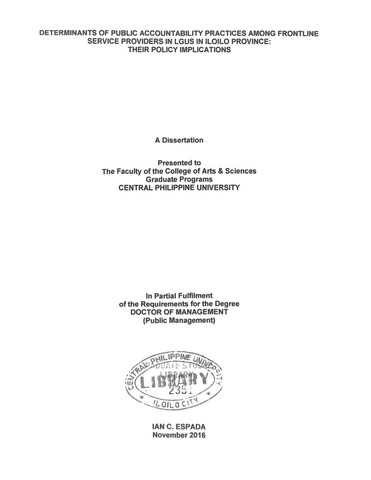Determinants of public accountability practices among frontline service providers in LGUs in Iloilo province: Their policy implications

Page views
818Petsa
2016May-akda
Tagapayo ng Tesis
Tagapangulo ng Panel ng Depensa
Magbahagi
Metadata
Ipakita ang buong tala ng item
Abstract
This descriptive-relational study that used a one-shot survey looked into the public accountability practices among the frontline service providers in the Local Government Units (LGUs) in the Province of Iloilo. The respondents of the study were 153 permanent frontline employees of the Assessor, Health, Local Civil Registrar and Social Welfare and Development offices of the LGUs. This study was conducted on the second semester of Academic Year 2015-2016 until the first semester of Academic Year 2016-2017. Data were collected using a self-administered, validates and reliability tested questionnaire. The relationship was determined using Chi-square test. Gamma was used to determine whether or not two variables are associated or independent of each other. Multiple Regression Analysis was used to determine the predictors of public accountability practices. The findings revealed that majority of the respondents had attended trainings and seminars; had good knowledge on RA 9485 and had fair knowledge on RA 6713. More than a half of the respondents had fairly favorable attitudes towards RA 9485, the majority had very favorable attitudes towards RA 6713. More than a half of the respondents had fair public accountability practices in terms of RA 9485, and about the same proportion in terms of RA 6713. There is no significant relationship between demographic and work-related characteristics of the respondents and their knowledge on RA 9485 and RA 6713. There is no significant relationship between demographic characteristics of the respondents and their attitude towards on RA 9485 and RA 6713. Among the six work-related characteristics, only monthly family income is significantly associated with attitude. There is no significant relationship between demographic and work-related characteristics of the respondents and their public accountability practices. Multiple regression results indicated that four variables significantly predict public accountability practices because the p-values are lower than .05 such as attitude (Beta=1.851, p=0.000), trainings (Beta=.0.672, p=0.004), gender (Beta=1.644, p=0.009) and no. of dependents (Beta=-1.266, p=0.013). The value indicates that for every unit increase in attitude, trainings, gender and number of dependents, there is an increase in public accountability practice. Attitude is considered as the strongest predictor of public accountability practices because of its higher Beta value (Beta-1.851, p=0.000).
Paglalarawan
Abstract only.
Mungkahing Sipi
Espada, I. C. (2016) Determinants of public accountability practices among frontline service providers in LGUs in Iloilo province: Their policy implications (Unpublished Doctoral dissertation). Central Philippine University, Jaro, Iloilo City.
Uri
DissertationMga Paksa
Mga keyword
Kagawaran
School of Graduate StudiesDegree
Doctor of ManagementLokasyon ng Istante
GSL Theses 658.0072/Es61
Pisikal na paglalarawan
xiii, 146 leaves

